

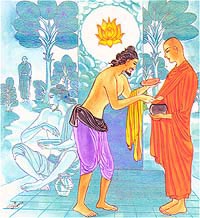 |
Verse 290. Give Up A Little, Achieve Much
Explanation: By giving up a modicum of pleasure, which the worldly pursuits bring, if one can be assured of tremendous pleasure - which is Nibbana - the wise person should give up the little pleasure. |
 |
Verse 291. When Anger Does Not Abate
Explanation: The individual who achieves happiness by inflicting pain on others is not freed from anger because he is entangled in the web of anger due to the contact of the anger of other people. |
 |
Verse 292. How Blemishes Increase
Explanation: If people do what should not be done, and neglect what should be done, the blemishes of those proud, slothful ones begin to increase. |
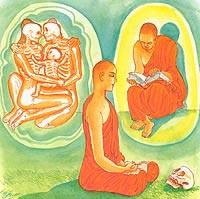 |
Verse 293. Mindfulness Of Physical Reality
Explanation: If one were to practice constantly on the mindfulness of physical reality, maintaining steady attention on what has to be done, they will shun what should not be done. The blemishes of those mindful, alert will get eroded. |
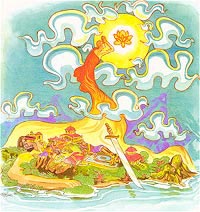 |
Verse 294. The Destroyer Who Reaches Nibbana
Explanation: The brahmin kills the mother - craving, kills the father - egotism, self-cherishing: They represent the two views, Eternalism and Nihilism, opposed to Buddhist thought. The subordinates are clinging to life. And he destroys the defilements which cling to life. Having destroyed all these, the brahmin (arahat) goes without punishment. |
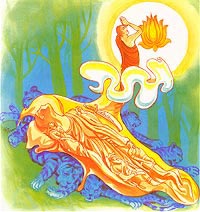 |
Verse 295. The ‘Killer’ Who Goes Free
Explanation: The brahmin (arahat) kills the mother - craving; kills the father - egotism; kills the two learned kings. They represent the two false views eternalism and nihilism. He kills the five tigers (sensuality, hate, mental inertia, worry and skeptical doubt) that obstruct the path. And, having done all these killings, the arahat goes about unaffected. |
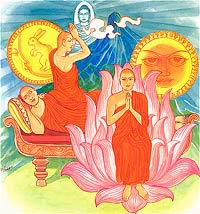 |
Verse 296. Reflect On The Virtues Of The Buddha
Explanation: Those disciples of the Buddha who are mindful of the virtues of their Teacher day and night, arise wide awake and in full control of their faculties. |
 |
Verse 297. Reflect On The Virtues Of The Dhamma
Explanation: Those disciples of the Buddha who are mindful of the virtues of the Dhamma day and night, arise wide awake and in full control of their faculties. |
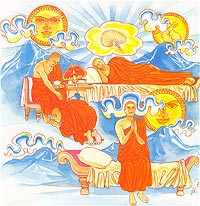 |
Verse 298. Reflect On The Virtues Of The Sangha
Explanation: Those disciples of the Buddha who are mindful of the virtues of the Sangha day and night, arise wide awake and in full control of their faculties. |
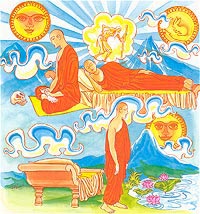 |
Verse 299. Reflect On The Real Nature of the Body
Explanation: Those disciples of the Buddha who are mindful of the real nature of the body day and night, arise wide awake and in full control of their faculties. |
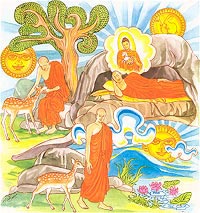 |
Verse 300. Reflect On Harmlessness
Explanation: Those disciples of the Buddha who take delight in harmlessness day and night, arise wide awake and in full control of their faculties. |
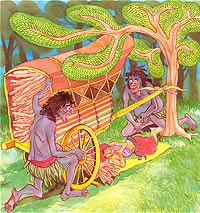 |
Verse 301. The Mind That Takes Delight in Meditation
Explanation: Those disciples of the Buddha who take delight in meditation day and night, arise wide awake and in full control of their faculties. |
 |
Verse 302. Samsara - Journey
Explanation: It is hard to become a monk; it is hard to be happy in the practice of a monk. To live with those of a different temperament is painful. A traveller in samsara is continually subject to dukkha; therefore, do not be a traveller in samsara; do not be the one to be repeatedly subject to dukkha. |
 |
Verse 303. He Is Honoured Everywhere
Explanation: He who is full of faith and virtue, who also possesses fame and fortune, in held in reverence wherever he goes. |
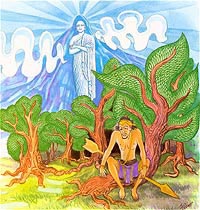 |
Verse 304. The Virtuous Are Seen
Explanation: Like the Himalayas, the good are visible even from afar; like arrows shot in the night, the wicked are not seen even though they may be near. |
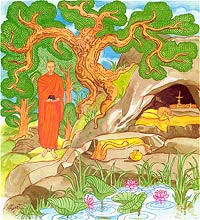 |
Verse 305. Discipline Yourself In SolitudeAlone one sits, alone one lies, Explanation: He who sits alone, lies down alone, walks alone, in diligent practice, and alone tames himself, should find delight in living in the forest. |
| |
|
|
| |
|
|
| |
|
| |
|
|
|
|
|
|
|